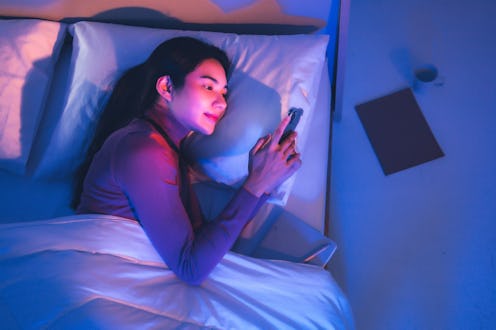Self
Experts Explain What Happens To Your Brain When You Doomscroll
Just five more Tweets…

Instagram, TikTok, and other apps are there for you in those boring in-between moments where you’re waiting for the bus and desperately need some stimulation. This kind of connection with others can be a huge boost — but experts tell Bustle too much social media can also affect your mood.
The COVID pandemic made people hyper-aware of this tradeoff. "As business has not been ‘business as usual,’ our screen time has increased," Dr. Clifford Segil, D.O., a neurologist at Providence Saint John's Health Center, tells Bustle. Time on social media exploded accordingly: Bloomberg reported in March 2020 that both Twitter and Facebook saw huge surges in usage since the pandemic began, with Facebook alone reporting 70% rises on its platforms WhatsApp and Instagram. Nearly half of 24- to 39-year-olds who responded to an April 2020 survey of 2,000 Americans conducted by Onepoll on behalf of Bustle said they were mainly using social media to scroll for hours.
Scrolling through Facebook for all the pictures of your BFF’s dog is great, but now, a year and change into the pandemic, there are a lot more answers about how your mood reacts when you’re scrolling all the time.
How Scrolling Through Apps For Hours Affects Your Brain
On the basic level, social media activates several areas of the brain at once. Segil says that it tends to light up the visual processing areas of the brain, as you interpret what you see, and the auditory pathways to sort out any sounds or music. It also switches on your expressive pathways, which control speech and language, when you want to craft a witty comment. "It activates similar brain regions to the ones used when focusing your attention on cognitive activities like reading or playing video games," Segil says, hence why you can end up scrolling for hours.
Staying on social media for ages can also impact how your brain regulates emotions, and you may have felt this intensely in 2020. "Many people [experienced] sadness, anxiety, anguish, frustration, and boredom during their quarantine or social distancing efforts," Dr. Sanam Hafeez Psy.D., a neuropsychologist, tells Bustle. But social media can help your brain get through it. When you're engaging with posts that make you feel good, particularly if you're engaging with somebody you know directly, your brain may react by giving you a boost. "Joy coincides with the release of dopamine and serotonin in the body," Hafeez says. These neurotransmitters are linked to increases in mood.
What Happens In Your Brain When You Doomscroll
There's a downside to the scroll, though. Segil says that social media tends to trigger your limbic system, which deals with emotional responses — good or bad. Social media may pack more of an emotional punch when you're not seeing people IRL; stress is known to affect the limbic system in the long term. If you're having more fights with people on Twitter or getting more upset about things you see online, this may be why.
Doomscrolling through news feeds looking for the latest updates can also be bad for your brain. Doomscrolling, the University of London noted, can mean "feeling caught up in and overwhelmed by a current of information that seems to run out of control." While doomscrolling may seem like a way to stay informed, it could simply be feeding your brain's stress response by bombarding it with negativity, prompting it to release cortisol and keep you on edge.
A study published in 2021 in Neuron found another explanation for why you can’t stop doomscrolling once you start. When you face the choice between learning more about bad news or clicking away, parts of your brain that encourage you to continue learning light up. Even if the new info is making you feel bad, your brain’s preference is to know more instead of turning off your phone and touching some grass.
That said, social media does have the potential to be used for good. "The social interaction that it is providing can be crucial in helping our minds cope with the confusing and worrisome times we are living in," says Hafeez. While doomscrolling endlessly may be making you needlessly panicky, there’s no need to throw your phone in the ocean — maybe turn your screen time notifications on instead.
Experts:
Dr. Sanam Hafeez, Psy.D.
Dr. Clifford Segil, D.O.
Studies cited:
Firth, J., Torous, J., Stubbs, B., Firth, J. A., Steiner, G. Z., Smith, L., Alvarez-Jimenez, M., Gleeson, J., Vancampfort, D., Armitage, C. J., & Sarris, J. (2019). The "online brain": how the Internet may be changing our cognition. World psychiatry : official journal of the World Psychiatric Association (WPA), 18(2), 119–129. https://doi.org/10.1002/wps.20617
Jamieson, K. & Albarracin, D. (2020). The Relation between Media Consumption and Misinformation at the Outset of the SARS-CoV-2 Pandemic in the US. Harvard Kennedy School Misinformation Review. 10.37016/mr-2020-012.
Jezzini, A., Bromberg-Martin, E. S., Trambaiolli, L. R., Haber, S. N., & Monosov, I. E. (2021). A prefrontal network integrates preferences for advance information about uncertain rewards and punishments. Neuron, S0896-6273(21)00353-6. Advance online publication. https://doi.org/10.1016/j.neuron.2021.05.013
Johnston, W. M., & Davey, G. C. (1997). The psychological impact of negative TV news bulletins: the catastrophizing of personal worries. British journal of psychology (London, England : 1953), 88 ( Pt 1), 85–91. https://doi.org/10.1111/j.2044-8295.1997.tb02622.x
This article was originally published on